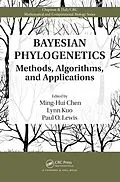Offering a rich diversity of models, Bayesian phylogenetics allows evolutionary biologists, systematists, ecologists, and epidemiologists to obtain answers to very detailed phylogenetic questions. Suitable for graduate-level researchers in statistics and biology, Bayesian Phylogenetics: Methods, Algorithms, and Applications presents a snapshot of c
Autorentext
Ming-Hui Chen is a professor of statistics and director of the Statistical Consulting Services at the University of Connecticut. He was the recipient of the 2013 American Association of the University Professors Research Excellence Award, the 2013 College of Liberal Arts and Sciences Excellence in Research Award in the Physical Sciences Division at the University of Connecticut, and the 2011 International Chinese Statisticians Association (ICSA) Outstanding Service Award. An elected fellow of the ASA and the IMS, Dr. Chen has served on numerous professional committees, including the 2013 president of the ICSA, the 2011-2013 board of directors of the International Society for Bayesian Analysis, the 2007-2010 executive director of the ICSA, and the 2004-2006 board of directors of the ICSA. He has also served on editorial boards of Bayesian Analysis, Journal of the American Statistical Association, Journal of Computational and Graphical Statistics, Lifetime Data Analysis, Sankhya, and Statistics and Its Interface. His research interests include Bayesian statistical methodology, Bayesian computation, Bayesian phylogenetics, categorical data analysis, design of Bayesian clinical trials, DNA microarray data analysis, meta-analysis, missing data analysis, Monte Carlo methodology, prior elicitation, statistical methodology and analysis for prostate cancer data, and survival data analysis.
Lynn Kuo is a professor of statistics at the University of Connecticut. An elected fellow of the ASA, she was previously a research fellow in the Statistical Survey Institute at the USDA and at the Statistical and Applied Mathematical Sciences Institute (SAMSI). Dr. Kuo received an outstanding service award from ICSA in 2013 and was the secretary and treasurer of the Section of Bayesian Statistics of the ASA in 1998-1999. She has been an associate editor of the Journal of American Statistical
Zusammenfassung
Continuing in the tradition of its predecessors, this new edition combines an informal, easy to read style with a thorough introduction to concepts and terminology of plant pathology. After reviewing fundamental concepts, the book discusses groups of plant pathogens and molecular tools for studying them, pathogen interactions, epidemiology and disease control, and special topics in plant pathology. The book details various disease-causing organisms, including viruses, fungi, prokaryotics, nematodes, and various biotic agents. It also examines various plant-pathogen interactions, molecular attack strategies, extracellular enzymes, host defenses, and disruption of plant function.New in the Third EditionMolecular plant-fungal interactionsExpanded treatment of molecular toolsAdvanced biocontrol conceptsHow to use and care for microscopes
Inhalt
Bayesian phylogenetics: methods, computational algorithms, and applications. Priors in Bayesian phylogenetics. IDR for marginal likelihood in Bayesian phylogenetics. Bayesian model selection in phylogenetics and genealogy-based population genetics. Variable tree topology stepping-stone marginal likelihood estimation. Consistency of marginal likelihood estimation when topology varies. Bayesian phylogeny analysis. Sequential Monte Carlo (SMC) for Bayesian phylogenetics. Population model comparison using multi-locus datasets. Bayesian methods in the presence of recombination. Bayesian nonparametric phylodynamics. Sampling and summary statistics of endpoint-conditioned paths in DNA sequence evolution. Bayesian inference of species divergence times. Index.
